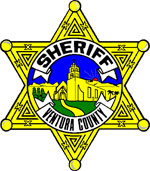|
Beware the reverse lottery scam, especially in this economy
By Anonymous — Wednesday, April 29th, 2009
 Ventura County Sheriff's Department A Thousand Oaks resident recently sent $5,000.00 to someone in Canada after being led to believe she had won the Publisher’s Clearing House $1,000,000.00 sweepstakes. The victim received an official looking check along with instructions to cash it and send $5,000.00 via Money Gram service to Canada. The funds were supposed to cover insurance for the big prize she was promised. She was expecting PCH officials to be at her house on Apr. 21, 2009, but they never came. The check she had cashed at her bank turned out to be fraudulent. However, the money she sent to Canada was not. She is now the victim of a $5,000.00 grand theft, and Publisher’s Clearing House had nothing to do with this scam. Advance-fee lottery scams are still a major problem. The letters and checks are arriving at your mailboxes right about now, just when you can least afford to give your money away to thieves. The targets are often people who can least afford to absorb the financial loss: the elderly. One thing people need to keep in mind is that there is no such thing as paying fees or taxes up front to claim any sweepstakes or lottery in the United States. If an offer seems too good to be true, then it is very likely a scam. Many unsuspecting victims have drained their savings accounts and wired money to thieves in places like Canada and Nigeria. Many of the cases go unsolved because of the international scope of the transactions. The suspects often send professional looking documents to the victims that appear legitimate. They follow up with persuasive phone calls to lure victims into sending or wiring money. The website for the Federal Trade Commission ( www.ftc.gov ) provides a wealth of information for consumers about a variety of fraud schemes, including international lotteries. According to the FTC, it is actually a violation of federal law to participate in a foreign lottery via the mail or by telephone. Additional information can be obtained from the website of the United States Secret Service, www.secretservice.gov , which contains information regarding the advance-fee fraud scheme. |
